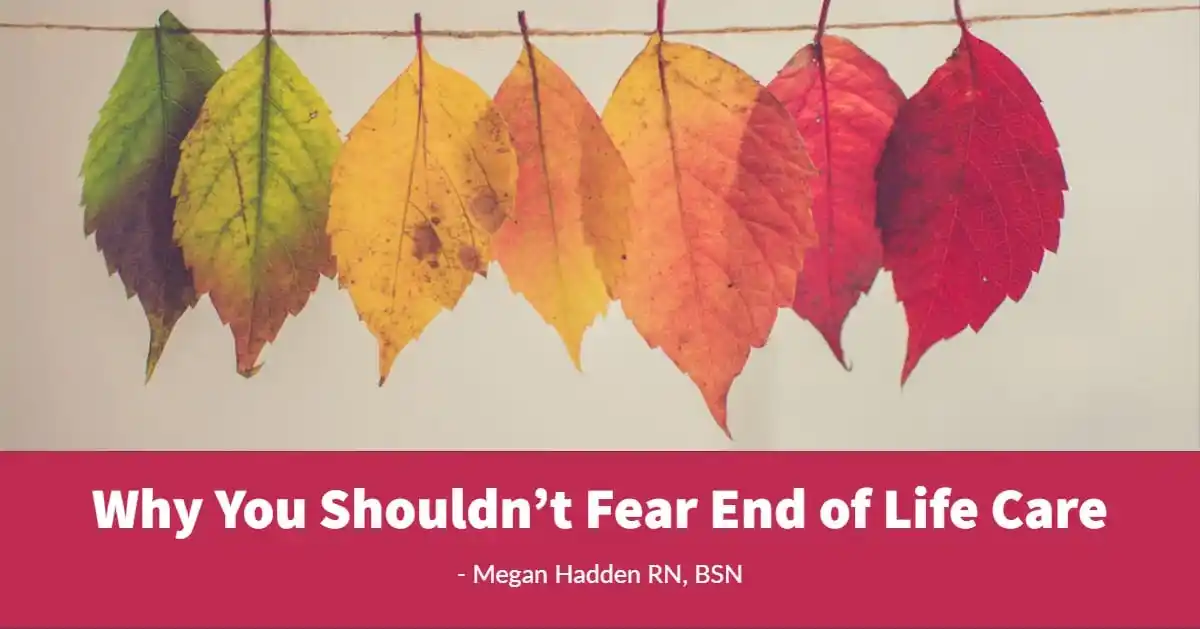Why You Shouldn’t Fear End of Life Care
The passing hours of the day and the ticking of the clock move quickly, and the end becomes a more apparent reality. As the mortality of those we love inches uncomfortably into our personal space, we begin to face not only the eventual physical loss of those we love, but also our own mortality. Disease and age take their hold, and our grip sometimes becomes tighter as we try to counter death’s pull; however, our grasp is futile. The end will come and we must face it, regardless of our submission to its inevitability. Acknowledging that our loved ones, or that we ourselves, are ready for “End of Life” care means that we must acknowledge there is an end. It means that we must stop pursuing a reversal of disease, and our subsequent grasp upon achieving health. We must submit to this end and allow others to come alongside us, as we journey towards the moment where we are birthed into a new life.
This season of life is sacred. It is not a season that is meant to be traveled through alone. End of life care is best when led by a team of professionals who not only believe fervently in the sacredness of this time but are also trained in symptom management. They seek to guide into a holistic pursuit of peace for all of those involved in the life of the human that is fading from this world. This beautiful support system includes nurses, nursing assistants, spiritual care coordinators, social workers, volunteers, and doctors, who all desperately want to see the dying person as comfortable and peaceful as possible. This team seeks to address not only physical needs, but spiritual, psychological, and social needs. This team surrounds not only a patient, but the patient’s family as well, with a holistic support system that is united with the common goal of creating the best end of life experience possible. When one is surrounded by a care team that truly understands the gift of the dying season, the family may also have a chance to view this season as a gift. This time can become a time of love, joy, peace, reconciliation, and even hope.
“View this season as a gift.”
The distraction of fighting disease often prevents one from the joy of intentionally living out our final days, weeks, and years. We all are dying, really, just some of us sooner or more quickly than others. Being intentional with whatever time we have left is all we really can control as the world continues to turn. In a healthcare system that is headstrong to solve every physical woe, what a relief to embrace life more than we embrace health.
“Quality of life is, by nature, individualized.”
The concept of health is subjective and should not be viewed through a singular lens. Making end of life decisions through the lens of quality of life enables there to be an individualized approach to healthcare. Quality of life is, by nature, individualized. Quality of life for one person might mean getting rid of all medications and laying on the beach every day, while for someone else it might mean adding more medications to help with symptom management. Quality of life might look like eating your favorite chocolate cake every day for dinner or getting a pedicure with your daughter. Quality of life might look like quietly dying at home or being surrounded by a community until your last passing breath escapes your lungs. There is a choice. There are options. There are people to help you to define how you want to spend your final, sacred seconds. What a peace it brings to know that we can choose what treatments we want and do not want—that we have the power to decide what quality of life is to us. Whether for ourselves or those we love, we should not fear the gift that is end of life care. It is a gift not allowed to many and its influence should not be underestimated. It is the gift of time, for self and others.
In such a complex healthcare system, that often focuses on numbers and computers more than the patients, there is little ability for the individual to make independent choices towards a better quality of life. In hospice, this is all that matters. As hospice professionals, we are constantly asking, “What is quality of life for this patient?” This is truly the last area of healthcare that still asks this question; that still has the time, resources, and freedom to ask this question. Entering hospice takes the patient out of the algorithm. The patient receives a platform to share who they are, what they need, and what they have to offer the world before they leave it. Death will come, but the journey to arrive there can be fulfilling and rewarding with a team of professionals who have walked this journey with so many others, and will help to guide the way. Even more importantly, this team will stand by the patient’s side faithfully and patiently, holding their hand as they exit this life and enter their new beginning.
Sold Out hospice stories on our hospice blog
Please feel free to contact us with any questions regarding hospice care


